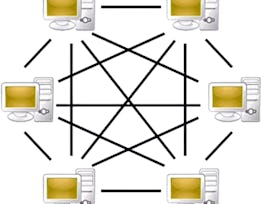In this course, we discuss peer-to-peer protocols and local area networks. Part one in this course is to answer the question of how does a peer-to-peer protocol deliver reliable data transfer service across unreliable transmission lines or networks. We focus on several medium access control protocols and their performance analysis. In the second part, we discuss how medium access control protocols coordinate the access to the communication channel so that information gets through from a source to a destination in the same broadcast local area network. We further discuss local area network and wireless LAN.


Peer-to-Peer Protocols and Local Area Networks
This course is part of Computer Communications Specialization
Taught in English
Some content may not be translated

Instructor: Xiaobo Zhou
34,512 already enrolled
Included with 
Course
(500 reviews)
94%
Details to know

Add to your LinkedIn profile
8 quizzes
Course
(500 reviews)
94%
See how employees at top companies are mastering in-demand skills

Build your subject-matter expertise
- Learn new concepts from industry experts
- Gain a foundational understanding of a subject or tool
- Develop job-relevant skills with hands-on projects
- Earn a shareable career certificate


Earn a career certificate
Add this credential to your LinkedIn profile, resume, or CV
Share it on social media and in your performance review

There are 5 modules in this course
This module examines peer-to-peer protocols and service models. Importantly, it examines three automatic repeat request (ARQ) protocols that provide reliable data transfer service.
What's included
5 videos7 readings2 quizzes1 discussion prompt
This module introduces TCP that uses ARQ techniques to provide reliable stream service and flow control end-to-end across connectionless packet network. It also examines two framing techniques that are used to identify the boundaries of frames of information within a digital bit stream, and discusses two data link control standards in widespread use.
What's included
3 videos4 readings2 quizzes1 discussion prompt
This module discusses the need for medium access control (MAC), and introduces representative random access and scheduling MAC protocols - including the carrier-sense multiple access with collision detection CSMA-CS protocol which forms the basis for the Ethernet LAN standard. It also shows the impact of delay-bandwidth product on protocol performance.
What's included
4 videos4 readings2 quizzes1 discussion prompt
This module discusses the structure of the frames used in LANs, and introduces several important LAN standards, including the IEEE 802.3 Ethernet LAN and IEEE 802.11 wireless LAN. Furthermore, the MAC protocols associated with each LAN standard are also described.
What's included
3 videos4 readings2 quizzes1 discussion prompt
This is a comprehensive peer review assessment
What's included
1 reading1 peer review
Instructor

Offered by
Recommended if you're interested in Computer Security and Networks

University of Colorado System

University of Colorado System

University of Colorado System

University of Minnesota
Why people choose Coursera for their career




Learner reviews
Showing 3 of 500
500 reviews
- 5 stars
81.80%
- 4 stars
11.40%
- 3 stars
3.40%
- 2 stars
1.40%
- 1 star
2%
New to Computer Security and Networks? Start here.

Open new doors with Coursera Plus
Unlimited access to 7,000+ world-class courses, hands-on projects, and job-ready certificate programs - all included in your subscription
Advance your career with an online degree
Earn a degree from world-class universities - 100% online
Join over 3,400 global companies that choose Coursera for Business
Upskill your employees to excel in the digital economy
Frequently asked questions
Access to lectures and assignments depends on your type of enrollment. If you take a course in audit mode, you will be able to see most course materials for free. To access graded assignments and to earn a Certificate, you will need to purchase the Certificate experience, during or after your audit. If you don't see the audit option:
The course may not offer an audit option. You can try a Free Trial instead, or apply for Financial Aid.
The course may offer 'Full Course, No Certificate' instead. This option lets you see all course materials, submit required assessments, and get a final grade. This also means that you will not be able to purchase a Certificate experience.
When you enroll in the course, you get access to all of the courses in the Specialization, and you earn a certificate when you complete the work. Your electronic Certificate will be added to your Accomplishments page - from there, you can print your Certificate or add it to your LinkedIn profile. If you only want to read and view the course content, you can audit the course for free.
If you subscribed, you get a 7-day free trial during which you can cancel at no penalty. After that, we don’t give refunds, but you can cancel your subscription at any time. See our full refund policy.

